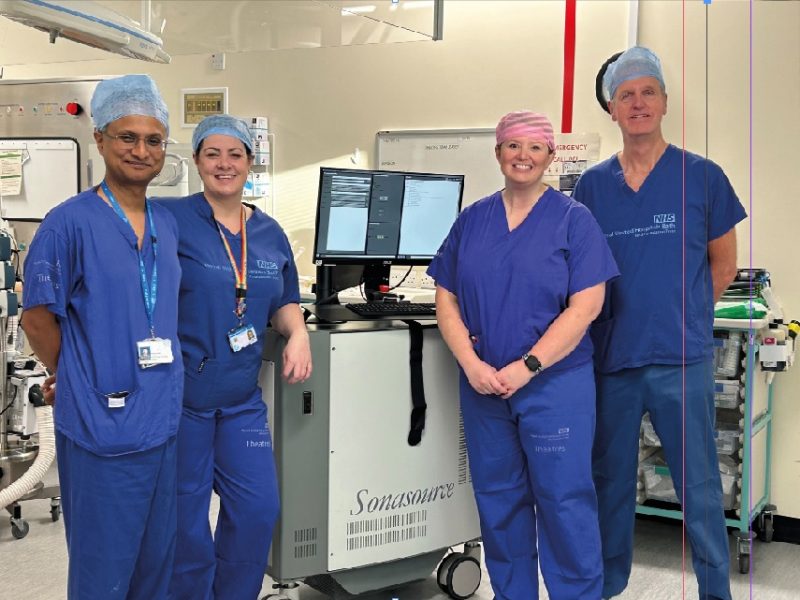Prostate Cancer News: Surgeons at the RUH have successfully treated two prostate cancer patients with a high intensity focused ultrasound (HIFU) treatment – the first time this therapy has been carried out in the region.
RUH Consultant Urologist Miss Lucy Simmons, mentored by Professor Hashim Ahmed and teamed up with cancer charity Prost8 and The UK Ultrasound Foundation.
The new HIFU unit integrates advanced image-guided capabilities and ultrasound energy to precisely target the prostate without any incisions or radiation, therefore sparing nearby healthy structures.
RUH Consultant Urologist Miss Lucy Simmons said: “Receiving a diagnosis of prostate cancer can be a challenging time for men and their loved ones. There are many options for treatment available and not all are suitable for everyone. It’s important to note that HIFU will be the right route for some men, but not all.
“Men with newly diagnosed prostate cancer in the region who feel they may be eligible for and interested in pursuing HIFU treatment should speak to their treating clinician and discuss referral for eligibility assessment to Bath.”
Pictured is the team of Professor Hashim Ahmed, of Imperial College London; Lucy Simmons, Consultant Urologist at RUH; Karen Cornett, VP Clinical Operations, Sonoblate; Paul Sayer, Founder of Prost8
PROST8 UK & PROSTATE CANCER
Prost8 UK focuses on naming sure that men with a new prostate cancer diagnosis are aware of all the treatment options available to them and where to access these. In particular, we are working to increase the number of NHS hospitals nationally that can provide minimally invasive treatment.
Achieving better lifestyle outcomes also means catching symptoms early and having access to effective and accurate diagnostic processes.
But, providing better, less invasive treatment options to improve post prostate cancer lifestyle outcomes is our primary aim.
Although we provide an overview of the main topics of prostate cancer on this website we are not, nor do we imply to be, medical specialists. Therefore, you should always refer to your GP or consultant for personalised advice.

WHAT IS PROSTATE CANCER?
EARLY DIAGNOSIS OF PROSTATE CANCER IS ESSENTIAL AS THE AGGRESSIVENESS VARIES CONSIDERABLY.
Some tumours develop very slowly and can often have little or no noticeable symptoms whereas other types grow rapidly and spread quickly, often breaking through the outer membrane of the prostate capsule.
Prostate cancer is considered ‘localised’ whilst it remains contained within the prostate gland with no evidence of cancerous cells outside the capsule. This is the optimal stage to find prostate cancer as it enables the patient to take advantage of the widest range of possible treatment options, and most importantly the newer, less invasive options. These include focal ablation including HIFU and Cryotherapy, as well as upcoming modalities such as electroporation, that Prost8 UK is campaigning for wider access to.
In non-localised prostate cancer cells have usually broken through or spread outside of the prostate capsule and invade surrounding tissues and organs, even spreading further through the body and affecting bones (metastasis).
The risk and incidence of prostate cancer increases with age. There are generally no obvious signs or symptoms during the early stages of the disease so regular screening is essential to catch new cancers early. Relying on watching for symptoms isn’t the best policy as by this time the cancer will generally be more advanced.
Important note: avoid random internet searches for information on prostate cancer (or any other illness or condition). There is a lot of inaccurate and spurious information which can cause unnecessary worry or worse still mislead you regarding the seriousness or otherwise of symptoms. If you have any doubts at all, always refer to your GP or a medical specialist to get a professional diagnosis. It is better to play safe, prostate cancer is always more treatable at an early stage.
SYMPTOMS OF PROSTATE CANCER
As Prostate Cancer is more often slow developing, there may be little or no obvious signs in the early stages. Because of this, the condition can be quite advanced by the time it is diagnosed.
The first symptoms are usually not experienced until the prostate has enlarged enough to physically apply pressure to the urethra (the tube that carries urine from the bladder). When the prostate does impact the urethra you may notice things like:
- peeing more frequently
- difficulty in peeing (straining or hard to start the flow)
- a feeling that your bladder has not fully emptied
- urgent need to urinate (rushing to the toilet)
- weak flow or taking a long time to pee
- signs of blood in the urine or semen
If you experience any of these symptoms they should not be ignored, BUT equally, it does not mean you have prostate cancer. They can be a sign of other conditions such as prostatitis (enlargement of the prostate, frequently associated with ageing). Always check with your doctor.

WHAT IS THE PROSTATE
The prostate is a smallish gland about the size of a walnut just below the bladder and in front of the rectum (back passage) and surrounds the urethra (the tube that carries urine from the bladder to the penis). It comprises 2 lobes and an outer layer called the capsule.
The main function of the prostate gland is to produce a thick white fluid, semen, which mixes with sperm produced by the testicles and is stored in a gland behind the prostate called the seminal vesicle.
The male hormone testosterone (which is the driver for things like your sex drive, erectile function and even muscle development) is made in the testicles and influences how the prostate works. This is why female hormones are used to suppress testosterone production as part of some treatment regimes for prostate cancer.
A collection of lymph nodes are situated near the prostate gland and two strands of nerves pass either side of and are attached to the prostate capsule. These nerves are sometimes affected by treatments for prostate cancer and damage can contribute to urinary incontinence and erectile dysfunction.
The prostate produces a protein called PSA (prostate-specific antigen) which helps to make semen more watery.
Doctors test PSA levels via a blood test to help diagnose different prostate problems, including cancer. A raised level, usually considered above 4 (nanograms per millilitre), may sometimes be a sign of prostate cancer, but this level can rise naturally in men as they get older so is always only one of the indicators.
WHAT CAUSES PROSTATE CANCER?
The causes of prostate cancer are largely unknown. However, certain things can increase your risk of developing the condition.
The chances of developing prostate cancer increase as you get older. Most cases develop in men in their 50’s or older, but it is not uncommon for men in their 40’s to be affected.
Although it is not understood why prostate cancer is more common in men of African-Caribbean or African descent, and less common in Asian men.
Men with a family history of prostate cancer (such as in a father, brother or uncle) or men of African-Caribbean heritage carry a higher risk of developing the condition themselves. Obesity is also now more widely considered to increase the risk.
More details at https://www.prost8.org.uk/

Bath Voice Monthly Newspaper is distributed free to thousands of homes and some supermarkets – distributed from the first of the month. Harry Mottram is the News Editor
Email him at news@bathvoice.co.uk Bath website: https://bathvoice.co.uk/news/
Bath Facebook: https://tinyurl.com/bdtf2kep Also on Twitter: https://twitter.com/bath_voice Read the newspaper online at :https://issuu.com/bathvoice To advertise to thousands of Bathonians call Erica on 07402 441485 or email her on erica@bathvoice.co.uk
Harry Mottram is a freelance journalist. Follow him on Facebook, LinkedIn, Twitter, Instagram, YouTube, Pinterest, Telegram, TikTok and Email:harryfmottram@gmail.com
Website:www.harrymottram.co.uk Mobile: 07789 864769

